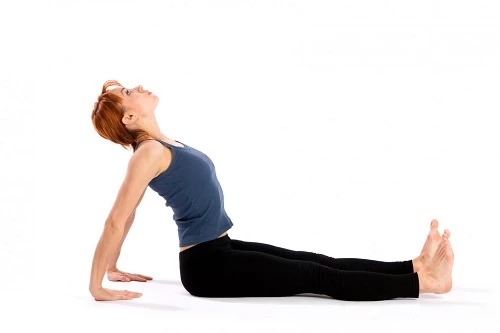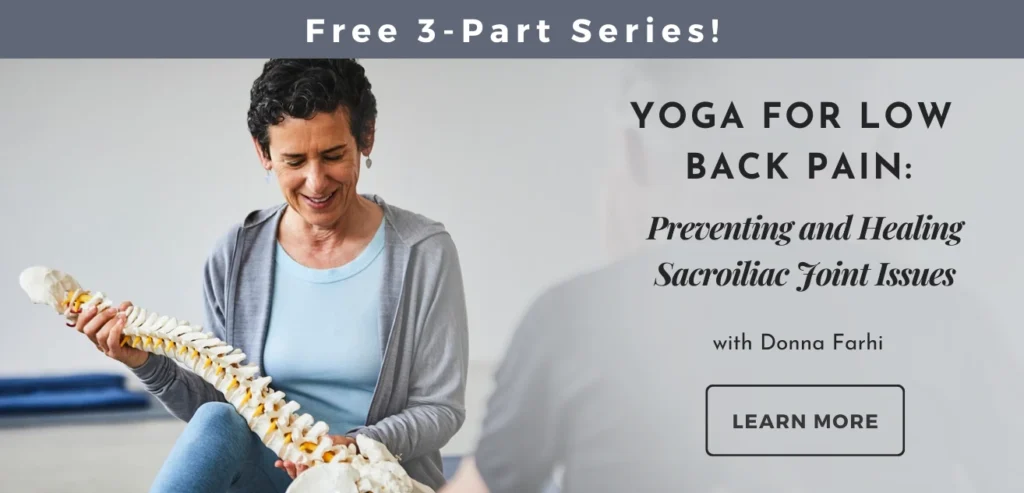Your Posture Affects How You Feel: Yoga Can Help

We all know that poor posture isn’t good for your back, neck and shoulders. However, a new study suggests that a slumped posture may also affect our mood, self-esteem and even our response to stress. Can yoga help to improve posture? Absolutely. Here’s how.
In an article recently published in Health Psychology, researchers in New Zealand randomly assigned 74 adults (45% men and 55% women) between the ages of 18-67 years to an upright, seated posture (n=39) or a slumped posture (n=35) group. Participants were told that the purpose of the study was to investigate the effects of physical therapy tape on their back.
As part of the study, the participants first completed a number of measures of mood and self-esteem. They were then fitted with a finger cuff to continuously measure blood pressure and heart rate. Those in the slumped posture group were asked to round their shoulders, stoop their backs and bow their heads. Those in the upright position were requested to sit upright with shoulders back and shoulder blades drawn toward each other. Therapy tape was then applied onto their backs, as were LED markers that assessed postural change.
Participants were asked to read instructions on “how to wash clothes” for 3 minutes to get baseline readings of heart rate and blood pressure and their reading speed. They were then asked to “imagine that they were being interviewed for their dream job and had 5 minutes to tell the panel why they were the best candidate.” After being given 5 minutes to mentally prepare, their speeches were video-recorded. They then completed a post-test assessment of mood, perceived threat and self-esteem.
Researchers found significant differences between the upright and slumped posture groups. Slumped participants indicated feeling more fearful, dull, sleepy, passive, nervous and quiet than those who were upright. Those sitting upright reported feeling stronger, more excited and enthusiastic and had greater self-esteem than those who were slumped.
In addition, upright participants also spoke more total words during their mock interview, and used more positive emotion words and fewer negative emotion words and first person personal pronouns than those who were slumped. They also had higher pulse pressure.
Based on the results, the study authors speculate that posture is likely to affect emotion through the activation of the autonomic nervous system, as well as the skeletal and neuroendocrine systems. They also suggest that self-perception may be contributing to differences between the upright and slumped groups. They were not able to determine whether or not posture directly impacted mood, however this remains a possibility.
How Can Yoga Help Improve Posture?
For yoga practitioners looking to improve their posture, there’s good news. Emerging evidence shows that consistent yoga practice can help to counteract a slumped posture by strengthening the muscles that support the spine. A recent study of novice and advanced yoga students and teachers published in Complementary Therapies in Medicine revealed that the erector spinae muscles, which are key to postural health, are activated considerably during Chair Pose, Upward Dog and Warrior Pose as are the upper trapezius muscles in the upper back. Muscle activation was greater and more efficient among more experienced practitioners.
A previous pilot study also suggests that yoga poses that target the shoulders, spinal erectors, abdominal muscles and neck may also help to reduce hyperkyphosis, or dowager’s hump. This is encouraging news for those with existing postural issues and for those trying to maintain good postural alignment as they get older. Yoga may provide a simple, but effective means to improve spinal muscle health, and to retain or improve overall mobility.
No matter your age or stage in life, a strong, upright posture is important for overall health and wellness. Now we know that it may also help you to have a sunnier and more resilient outlook on life.
 B Grace Bullock, PhD, E-RYT 500 is a psychologist, research scientist, educator, author, yoga and mindfulness expert and creator ofBREATHE: 7 Skills for Mindful Relationships. Her mission is to reduce stress, increase health and wellbeing and improve the quality of relationships. She offers classes, workshops, writing and research that combine the wisdom of applied neuroscience, psychophysiology, psychology and contemplative science and practice. Her goal is to empower individuals, groups, leaders and organizations to reduce chronic stress and increase awareness, attention, compassion, mindfulness and effective communication to strengthen relationships, release dysfunctional patterns and unlock new and healthy ways of being. Dr. Bullock is a Certified Viniyoga Therapist and Faculty at the Integrated Health Yoga Therapy (IHYT) Training program. She is the former Senior Research Scientist at the Mind & Life Institute and former Editor-in-Chief of the International Journal of Yoga Therapy. For more information see www.bgracebullock.com
B Grace Bullock, PhD, E-RYT 500 is a psychologist, research scientist, educator, author, yoga and mindfulness expert and creator ofBREATHE: 7 Skills for Mindful Relationships. Her mission is to reduce stress, increase health and wellbeing and improve the quality of relationships. She offers classes, workshops, writing and research that combine the wisdom of applied neuroscience, psychophysiology, psychology and contemplative science and practice. Her goal is to empower individuals, groups, leaders and organizations to reduce chronic stress and increase awareness, attention, compassion, mindfulness and effective communication to strengthen relationships, release dysfunctional patterns and unlock new and healthy ways of being. Dr. Bullock is a Certified Viniyoga Therapist and Faculty at the Integrated Health Yoga Therapy (IHYT) Training program. She is the former Senior Research Scientist at the Mind & Life Institute and former Editor-in-Chief of the International Journal of Yoga Therapy. For more information see www.bgracebullock.com



